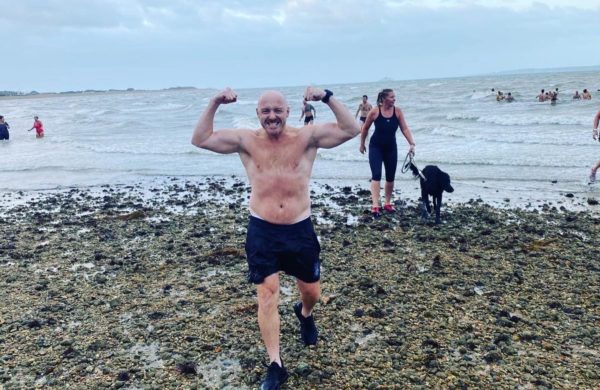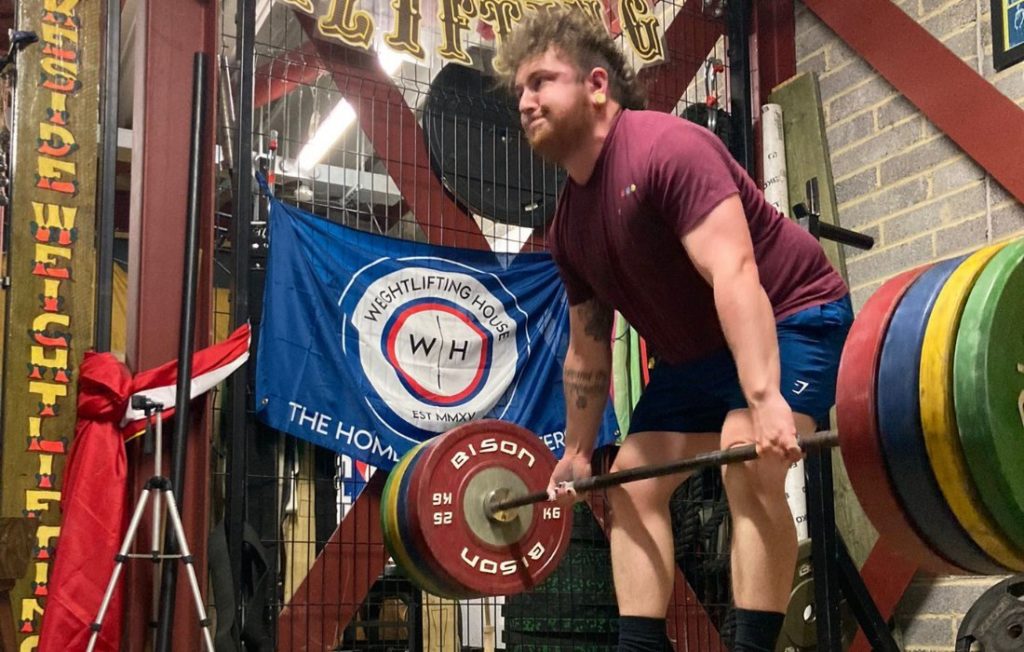
Sea swimming for my mental health
Chris uses being active to look after his mental health.
Date: 8 April 2022 Author: Energise Me
For Jared, what started as an experiment to find a hobby where he didn’t have to hide that he was trans, turned into a lifeline for looking after his mental wellbeing. Weightlifting has helped him through depression and PTSD.

I am a transgender man. I transitioned over ten years ago now.
When I was a child, I was never known to be particularly active. I didn’t play on any school teams and I didn’t enjoy sports days either. As a girl, I basically had the option of netball or athletics. Both of which I did not like. I never got into football either. My stepbrothers played but it wasn’t for me.
So, I’ve always been a bookworm and more creative – art, music, and writing. I would hermit away to work on such hobbies. It was easier for me to be on my own or in very small groups, five tops. I did briefly do fencing as a teenager where I was constantly mistaken for a boy. I never wore the “boob cups” as we called them. Before going to university, I got injured and had to stop. I slipped during a lunge and pulled the tendons that hold my knee together.
I came out as trans during university. There were a few times I tried to train, but I always gave up in the end. There were several reasons for this. I felt that I stood out too much. A small pre-testosterone trans guy trying to train in a commercial gym. I was scared of using the changing rooms. I’d had enough run-ins in public bathrooms from men. Also, I had been told for several years that girls couldn’t get buff from weight training so, how could I, a pre-hormone therapy trans guy, get buff from weight training?
In the end, I got into training at the University gym properly once I’d graduated and started working at the gym itself – in the admin team, ironically!
What I had not expected was how it would help with my anxiety as well – redirecting the anxious, nervous energy into something physically focused.
Unrelated to my trans status, I’ve had depression and anxiety for nearly two decades. I am currently getting therapy for PTSD. At University and since I have been on and off anti-depressants and other medication, with short stints in therapy when I could. NHS funded therapy is usually around 6-12 weeks if you’re lucky. I couldn’t afford private therapy so there was a lot of bouncing around services in that area.
I started working out to proactively alleviate pent up anger and frustration. Something which had peaked during my transition with second puberty. I did not have another outlet to work through that energy. I also wanted to become more muscular. To beef up my otherwise pear-shaped frame so I would pass better in daily life. What I had not expected was how it would help with my anxiety as well. It worked to redirect the anxious, nervous energy into something physically focused.
After a couple of years of getting used to a commercial gym environment, and gaining confidence in myself, I joined a CrossFit gym where a colleague attended and coached. For me, it was a big adjustment. Being in a commercial gym setting there is a non-verbal agreement to not talk to other people. You just get in, train, get out. Suddenly, at CrossFit, there was a team environment I had never been a part of before!
It was through CrossFit that I found Olympic Weightlifting. Whilst CrossFit was a mixed bag – a little bit of everything – Olympic Weightlifting captivated me. The focus is on two lifts, drilling the skill over and over, trying out new and (for me anyway) strange movements to iron out imbalances and so on in the form. There was a lot to work on as I’d barely done any training in my life!
I found I could clock out from work and my studies (I was studying for a Masters degree part-time) and focus on the lifting. It had a kind of Zen element to it. For that hour and a half, it was just me, the coach, and the barbell.
By focusing on Olympic Weightlifting, I would go to CrossFit and use the open gym to work through my programmed session. Being in the corner on my own felt isolating. Not a fault of the CrossFit box as such, it is an environment that thrives in the class sessions and my interests had simply moved away from that.
After a while, that mindfulness of me and the barbell began to feel less empowering and more isolating. Most of the people I had got to know when I joined began to move on too. I made new friends, some I am still close to now, but it didn’t feel the same. So, I decided to look for a weightlifting focussed gym to try and regain some of that camaraderie whilst training. I also wanted an environment where I didn’t feel like I needed to hide my trans status. The coaches knew, as did my friends, but I felt like I needed to hide it from most people. Anyway – that’s how I found Lizzie Havers at Lakeside Weightlifting.
I’m out about being gay and trans, no one cares! People also know about my mental health and there is no judgement.
Lakeside Weightlifting is a small gym but that really doesn’t matter. Lizzie and the other lifters who train there are what make it so great! We all know each other well and respect each other’s boundaries so, even when my mental health is causing me to struggle, I know I can come in and train without feeling under any pressure to be upbeat and overly chatty
I’m out about being gay and trans, no one cares! People also know about my mental health and there is no judgement. We can talk about these things without worrying or being scared of what anyone else thinks. It is truly a massive breath of fresh air!
Since training at Lakeside, either in Olympic Weightlifting or Powerlifting which I am currently trying out, I have somewhere safe to go and release pent up energy. I have since completed my Masters degree and am working towards a PhD. The PhD process is stressful plus the depression, anxiety and PTSD I can become mentally exhausted whilst my physical body is still full of energy.
This can mean I struggle to sleep as my body is not ready for it, even though my mind is tired. It can create a spiral effect of mental overtiredness and lack of sleep, causing “brain fog” where I can’t focus properly or my attention span waivers. Going to Lakeside means I can turn up, leave big theoretical PhD questions at the door, and just focus on the physical task at hand! Just me and the barbell. And Lizzie’s programming of course!
Having a safe space outside of home, a hobby that started as a “we’ll see how it goes” experiment, turned into a lifeline. It was a game-changer.
On difficult days depression can negatively affect the lifting – lack of belief in yourself does that at the best of times – but Lizzie is so understanding. I also competed for the first time ever at Lakeside a few years ago, and again more recently without having to try and hide my trans status. Instead of wondering if people would out me and stop me lifting with the men, I could just relax and focus on the lifting.
I believe it is through Lakeside and weightlifting that I found the courage to go back into therapy properly. I am married and my husband is very supportive of my journey. But having a safe space outside of home, a hobby that started as a “we’ll see how it goes” experiment turned into a lifeline. It was a game-changer.
I love weightlifting especially at Lakeside because it supports my mental well-being and my mental health journey. I feel safe going to train even when my mental health is low because it is not a “problem” at Lakeside, it’s just a thing that happens, which might seem small but is an amazing experience to not feel pressured or judged. And moving around heavy weight is really good fun!
As how I manage my mental health improves, my body is improving too. I feel healthy and strong within my own body which is a pretty new sensation for me. I’ve filled out into this body which is mine and I appreciate it now more than ever. Physical training does not cure mental health but having a support network, safe environments, and getting that serotonin boost really does help.
Find activities to try in your local area, both in-person and online.
Visit siteSport in Mind has great resources to help you get started being active and help your mental health.
Visit site